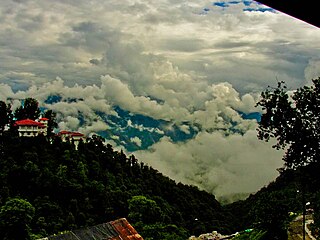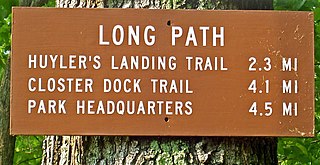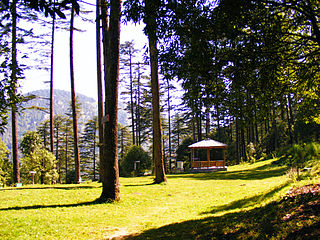
A hike is a long, vigorous walk, usually on trails or footpaths in the countryside. Walking for pleasure developed in Europe during the eighteenth century. Long hikes as part of a religious pilgrimage have existed for a much longer time. "Hiking" is the preferred term in Canada and the United States; the term "walking" is used in these regions for shorter, particularly urban walks. In the United Kingdom and the Republic of Ireland, the word "walking" describes all forms of walking, whether it is a walk in the park or backpacking in the Alps. The word hiking is also often used in the UK, along with rambling, hillwalking, and fell walking. The term bushwalking is endemic to Australia, having been adopted by the Sydney Bush Walkers Club in 1927. In New Zealand a long, vigorous walk or hike is called tramping. It is a popular activity with numerous hiking organizations worldwide, and studies suggest that all forms of walking have health benefits.

Ruskin Bond is an Indian author. His first novel, The Room on the Roof, published in 1956, received the John Llewellyn Rhys Prize. Bond has authored more than 500 short stories, essays, and novels which includes 69 books for children. He was awarded the Sahitya Akademi Award in 1992 for Our Trees Still Grow in Dehra. He was awarded the Padma Shri in 1999 and Padma Bhushan in 2014.

Dehradun, also known as Dehra Doon, is the winter capital and the most populous city of the Indian state of Uttarakhand. It is the administrative headquarters of the eponymous district and is governed by the Dehradun Municipal Corporation, with the Uttarakhand Legislative Assembly holding its winter sessions in the city as its winter capital. Part of the Garhwal region, and housing the headquarters of its Divisional Commissioner, Dehradun is one of the "Counter Magnets" of the National Capital Region (NCR) being developed as an alternative centre of growth to help ease the migration and population explosion in the Delhi metropolitan area and to establish a smart city in the Himalayas.

Mussoorie is a hill station and a municipal board, in Dehradun city in the Dehradun district of the Indian state Uttarakhand. It is about 35 kilometres (22 mi) from the state capital of Dehradun and 290 km (180 mi) north of the national capital of New Delhi. The hill station is in the foothills of the Garhwal Himalayan range. The adjoining town of Landour, which includes a military cantonment, is considered part of "greater Mussoorie", as are the townships Barlowganj and Jharipani.

The Long Path is a 357-mile (575 km) long-distance hiking trail beginning in New York City, at the West 175th Street subway station near the George Washington Bridge and ending at Altamont, New York, in the Albany area. While not yet a continuous trail, relying on road walks in some areas, it nevertheless takes in many of the popular hiking attractions west of the Hudson River, such as the New Jersey Palisades, Harriman State Park, the Shawangunk Ridge and the Catskill Mountains. It offers hikers a diversity of environments to pass through, from suburbia and sea-level salt marshes along the Hudson to wilderness and boreal forest on Catskill summits 4,000 feet (1,220 m) in elevation.

Landour, a small cantonment town contiguous with Mussoorie, is about 35 km (22 mi) from the city of Dehradun in Dehradun district in the northern state of Uttarakhand in India. The twin towns of Mussoorie and Landour, together, are a well-known British Raj-era hill station in northern India. Mussoorie-Landour was widely known as the "Queen of the Hills". The name Landour is drawn from Llanddowror, a village in Carmarthenshire in southwest Wales. During the Raj, it was common to give nostalgic English, Scottish, Welsh or Irish names to one's home, reflecting one's ethnicity. Names drawn from literary works were also common, as from those by Robert Burns, Sir Walter Scott, Thomas Hardy, Robert Louis Stevenson and many others.

St. George's College, Mussoorie, is an all-boys boarding and non-boarding school in Mussoorie, in the state of Uttarakhand, India, affiliated to the Council for the Indian School Certificate Examinations board. The school, an all-boys residential and non-residential institution, spreading over 400 acres (1.6 km2) of land, was founded in 1853 by the Capuchin Fathers and entrusted to the Society of the Brothers of St. Patrick (Ireland) in 1894. It was opened in a cottage known as Manor House; the name by which the campus is still known. The students are known as Manorites.

Harsil is a village, tourist hill station and army area located on the banks of the Bhagirathi River, on the way to Gangotri, a Hindu pilgrimage site in Uttarkashi district of the Indian state of Uttarakhand.

Dhanaulti is a quiet hill station at an elevation of 2286 meters above sea level, it offers panoramic views of the lofty Himalayas.

Outdoor recreation or outdoor activity refers to recreation done outside, most commonly in natural settings. The activities that encompass outdoor recreation vary depending on the physical environment they are being carried out in. These activities can include fishing, hunting, backpacking, walking and horseback riding — and can be completed individually or collectively. Outdoor recreation is a broad concept that encompasses a varying range of activities and landscapes.
The Savoy, is a historic luxury hotel in the hill station, Mussoorie, in Uttarakhand state of India, owned by Mr. Kishore Kaya and Managed by the ITC Hotels. Established in 1902, built in English Gothic architecture style mostly in wood, the hotel is spread over 11 acres (45,000 m2) with 50 rooms at present, and overlooks the Himalayas. After the railway reached Dehradun in 1900, Mussoorie became more popular, and was the chief summer resort for European residents of the British Raj, from the plains of the United Provinces. Its bar, known as the 'Writer's Bar' remained famous for many decades after the independence of India in 1947.

A long-distance trail is a longer recreational trail mainly through rural areas used for hiking, backpacking, cycling, horse riding or cross-country skiing. They exist on all continents except Antarctica.

Dehradun Terminal railway station is a railway station in Dehradun, Uttarakhand, India, on the Northern line of the Northern Railway network. It is owned by Indian Railways.
William John Dwyer Burkitt was a judge in British India.

Lokesh Ohri is an Indian anthropologist, historian, writer and a cultural activist based in Dehradun, Uttarakhand, who has campaigned for the preservation of the natural and cultural heritage of the Doon Valley. He is the founder of Been There Doon That, an educational initiative that spreads awareness about the natural, social and cultural history of the Doon Valley through walks, lectures and workshops.
Rispana River is a tributary of the Song River that drains central Dehradun in Uttarakhand, India. It emerges from a small spring at the base of Mussoorie ridge near Rajpur village. Currently, the Rispana is contaminated as many of the city's sewage lines empty into the river and it has been encroached upon in many places. In 2018, a plan was initiated to revive the Rispana and Bindal rivers.
Dehradun canals refers to the heritage network of canals that was once spread across Dehradun in Uttarakhand, India, with the earliest, Rajpur Canal, dating back to early 17th century. After the city became the state capital in 2000, rapid and unchecked road-widening schemes led to the covering, or in some cases demolition, of most of the historic canals. One of the last remaining canals was covered in 2007.

Frederick Wilson also known as Raja of Harsil, Pahari Wilson or Shikari Wilson was a British sportsman, army deserter, and settler in the Himalayas. He was a keen hunter and naturalist who wrote in sporting magazines under the pen-name "Mountaineer". He obtained the rights to lands around Harsil from the local rule and was involved in cutting down trees in to supply the early railways in India with sleepers. He was treated as a local king in the Harsil region, and even minted a currency of his own. It has been claimed that Rudyard Kipling's story The Man Who Would Be King was based on him.















